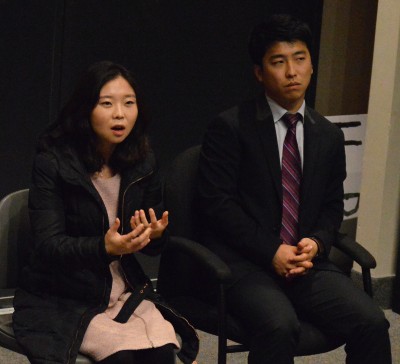
Three North Korean defectors spoke Monday about their escape from the socialist country and their transition into their new lives at a panel hosted by Boston University’s Liberty in North Korea (LiNK) student group.
Approximately 75 students from Boston area universities attended the seminar, titled NK Information Highway: Driving Change in North Korea, which included a panel, question-and-answer session and opportunity for networking in a lecture hall in the School of Education.
Gwangsung Jung, one of the defectors, said it was difficult adjusting to a different life after escaping North Korea in 2006, but he is grateful for the opportunities he has had since.
“You have to remember that I was brainwashed for a big part of my life, so I had to start studying everything from zero,” he said during the panel. “The hardest part was learning English because in North Korea, we were taught that Americans were the enemy, so they never taught us any information, but I know that English is important for my future, so I am putting in all of my efforts to succeed in life with English.”
Jung said increased dissemination of information in North Korea is the solution to most of the country’s issues.
“I couldn’t do anything before,” he said. “I couldn’t express anything I thought. In North Korea, I didn’t even know that people were allowed to travel freely. Coming to South Korea, I discovered that people could get a passport and travel where they wanted, so for now, my goal in life is to bring this awareness for freedom and human rights in North Korea.”
Sejun Park, another defector, said poverty is a serious problem in North Korea and contributes to citizens’ isolation.
“Koreans live isolated from any type of information entry,” he said on the panel. “They are completely controlled and have no form of comparing their lives to other countries. Therefore, they do not know about human rights.”
Eunju Kim, the final panelist and defector, said as a former student in the North Korean education system, she was subjugated to watch severe acts of violence, such as public executions.
“When you are watching the public execution, the things from body, all things comes from the body, but we [had] to watch it, and it was part of the education in North Korea,” she said on the panel. “During the long famine, there was no humanity left to people in North Korea. My father’s friend, he stole food from my father’s funeral.”
Sejun said he wants the people of North Korea to be able to democratize on their own accord.
“By accessing the information that North Koreans have not gotten this far, they will be able to understand the corruption that goes on in the government and the truth about around the world,” he said. “The organization has been working to send information into North Korea over the past seven years through different technologies and hardware.”
North Korea Strategy Center and its sister organization Woorihana focus on human rights reform in North Korea through information dissemination, said Sharon Stratton, the U.S. program officer at Woorihana. Deepa Patel, president of LiNK, said representatives from the organizations contacted LiNK to bring the defectors to BU.
“They seem to all have questions about things that we say pretty often within our club, but we don’t realize that other people don’t know about it,” Patel said. “We are going to continue to hold our events, and hopefully, we get more attention to our events. It’s important to hear their voices, and most people don’t get to.”
Several attendees said they are interested in learning how they can contribute to the cause.
Todd Reiss, a freshman in the College of General Studies, said hearing from the defectors about their struggles was eye-opening and will encourage him to stay more aware of the situation in North Korea.
“They have strict government regulation of what they are allowed to watch, and what I didn’t know is that some people sneak around the government and obtain drives with South Korean films, which is something I didn’t expect went on, the fact that it does provide insight of what the people think of their own government, the fact that they are going against their back,” he said.
Kevin Huang, a freshman in CGS, attended the event after hearing about it on social media.
“I just wanted to hear from the defectors and learn their stories,” he said. “It must be a real struggle for North Koreans to live every day with the propaganda, the social problems, and the economy is bad there as well. I will support the social change on media and be involved in the club in the future.”
















































































































David • Feb 24, 2015 at 8:28 pm
Great job to the speakers!
I know Eunju from when she came to Chicago for an event before. She also wrote a book, which will be available in English starting in July:
http://www.amazon.com/Thousand-Miles-Freedom-Escape-North/dp/1250064643
Lisa Orme • Feb 24, 2015 at 5:09 pm
An excellent way to support the cause is to help raise funds for Free North Korea Radio, a defector-run short wave radio program that brings news, hope and enlightenment to the oppressed people of NK. Contact the North Korea Freedom Coalition for information on how to contribute to this very important NGO.